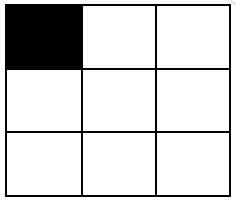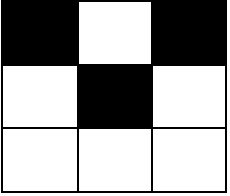LeetCode in Kotlin
2768. Number of Black Blocks
Medium
You are given two integers m and n representing the dimensions of a 0-indexed m x n grid.
You are also given a 0-indexed 2D integer matrix coordinates, where coordinates[i] = [x, y] indicates that the cell with coordinates [x, y] is colored black. All cells in the grid that do not appear in coordinates are white.
A block is defined as a 2 x 2 submatrix of the grid. More formally, a block with cell [x, y] as its top-left corner where 0 <= x < m - 1 and 0 <= y < n - 1 contains the coordinates [x, y], [x + 1, y], [x, y + 1], and [x + 1, y + 1].
Return a 0-indexed integer array arr of size 5 such that arr[i] is the number of blocks that contains exactly i black cells.
Example 1:
Input: m = 3, n = 3, coordinates = [[0,0]]
Output: [3,1,0,0,0]
Explanation: The grid looks like this: 
There is only 1 block with one black cell, and it is the block starting with cell [0,0].
The other 3 blocks start with cells [0,1], [1,0] and [1,1]. They all have zero black cells.
Thus, we return [3,1,0,0,0].
Example 2:
Input: m = 3, n = 3, coordinates = [[0,0],[1,1],[0,2]]
Output: [0,2,2,0,0]
Explanation: The grid looks like this: 
There are 2 blocks with two black cells (the ones starting with cell coordinates [0,0] and [0,1]).
The other 2 blocks have starting cell coordinates of [1,0] and [1,1]. They both have 1 black cell.
Therefore, we return [0,2,2,0,0].
Constraints:
2 <= m <= 1052 <= n <= 1050 <= coordinates.length <= 104coordinates[i].length == 20 <= coordinates[i][0] < m0 <= coordinates[i][1] < n- It is guaranteed that
coordinatescontains pairwise distinct coordinates.
Solution
class Solution {
fun countBlackBlocks(m: Int, n: Int, coordinates: Array<IntArray>): LongArray {
val ans = LongArray(5)
val count: MutableMap<Int, Int> = HashMap()
for (coordinate in coordinates) {
val x = coordinate[0]
val y = coordinate[1]
for (i in x until x + 2) {
for (j in y until y + 2) {
if (i - 1 >= 0 && i < m && j - 1 >= 0 && j < n) {
count.merge(
i * n + j,
1,
) { a: Int?, b: Int? -> Integer.sum(a!!, b!!) }
}
}
}
}
for (freq in count.values) {
++ans[freq]
}
ans[0] = (m - 1L) * (n - 1) - ans.sum()
return ans
}
}

